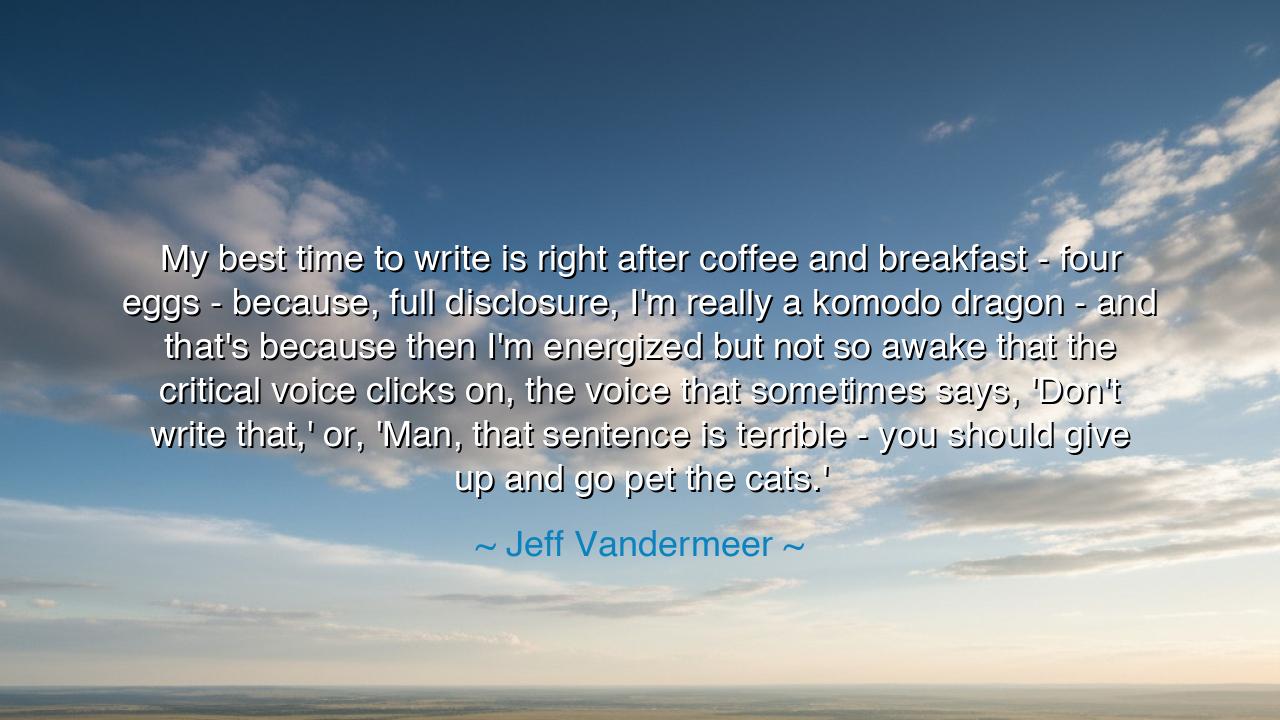
My best time to write is right after coffee and breakfast - four
My best time to write is right after coffee and breakfast - four eggs - because, full disclosure, I'm really a komodo dragon - and that's because then I'm energized but not so awake that the critical voice clicks on, the voice that sometimes says, 'Don't write that,' or, 'Man, that sentence is terrible - you should give up and go pet the cats.'






Hear, then, the strange and playful wisdom in the words of Jeff VanderMeer: “My best time to write is right after coffee and breakfast—four eggs—because, full disclosure, I’m really a komodo dragon—and that’s because then I’m energized but not so awake that the critical voice clicks on, the voice that sometimes says, ‘Don’t write that,’ or, ‘Man, that sentence is terrible—you should give up and go pet the cats.’” Though his tongue is wrapped in humor, yet beneath the jest lies a truth ancient and enduring: that the artist must learn to outwit his own mind, to slip past the guards of doubt, and to write in the freshness of the morning when the soul is warmed but not yet besieged by judgment.
For what is this komodo dragon but an image of raw instinct, of untamed energy, of the primal creature within us that acts without hesitation? In his playful self-portrait, VanderMeer teaches that creation does not always emerge from sharpened intellect or polished reason, but from that half-waking state when energy rises but the inner critic still slumbers. The ancients, too, spoke of such states: the Greeks called it divine madness, when poets and seers became vessels of inspiration before the sober mind bound them in chains.
So it is with every act of creation. When the critical voice awakens too early, it mocks the artist, it scorns the first rough strokes of genius, it whispers poison: “This is unworthy, cast it aside.” Yet, when the spirit is both nourished and softened—like VanderMeer after his four eggs and coffee—the mind’s walls grow thin, and the current of imagination flows unimpeded. The lesson is not merely about food or morning ritual, but about knowing the hour when your own gates of inspiration open most freely, and guarding it with reverence.
Consider the example of Beethoven, who in the quiet hours of dawn would walk the fields, humming fragments of melodies to himself before the day’s burdens fell upon him. In those hours, he was not the titan locked in combat with symphonies, but a wanderer whose instincts sang freely. Later, when the critic awoke within, he would refine, polish, and carve from marble. But the first breath of music, the spark that lit the fire, was captured only in that half-dreaming state when creation flows unchained.
Thus the wisdom of VanderMeer is not trivial. He teaches that the battle of the artist is not only against the world, but against the inner enemy, the skeptical voice that fears failure. And to overcome, one must sometimes trick the self: by timing, by ritual, by rhythm of body and spirit. To eat, to sip, to enter the day not fully awake, but awake enough to wield the pen, this is a form of cunning—like Odysseus slipping past the Cyclops, the artist slips past the critic.
The lesson for us, then, is clear: learn your own season of power. Do not force yourself into the mold of others, but observe when your flame burns brightest and your critic is weakest. Guard that hour as sacred. When it arrives, write, paint, compose, speak—without hesitation. Let the words spill, unjudged, unmeasured. The time for correction will come, but if the first fire is never lit, there is nothing to refine.
Practically, let each of us create a ritual: perhaps it is morning after coffee, perhaps night when the world sleeps, perhaps a walk beneath the trees. Wherever the inner dragon stirs, there let us act. And when the critical voice whispers its scorn, do not fight it head-on, but slip past it, giving yourself permission to be imperfect, to be bold, to simply begin.
And so I say: eat your eggs, drink your coffee, awaken the komodo dragon within you. Then seize your pen before the critic sharpens his blade. For those who wait for perfection before they begin will never begin. But those who dare to create in the moment of wild freedom will find that their words, though rough at first, contain the breath of eternity.






AAdministratorAdministrator
Welcome, honored guests. Please leave a comment, we will respond soon